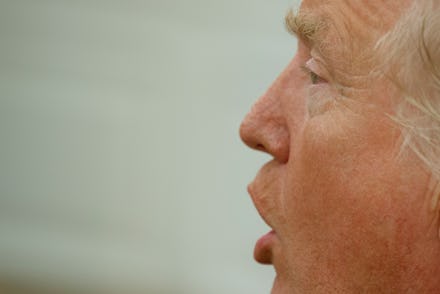Trump threatens NBC broadcasting license after report about nuclear arsenal

President Donald Trump went after NBC News on Wednesday after the network reported that Trump told advisers he wanted to increase the United States’ nuclear arsenal tenfold. The NBC News story cited three unnamed officials who were in the room at the time of a meeting with national security leaders.
In two tweets Wednesday morning, Trump went after NBC for the reports, calling NBC “fake” and the report “pure fiction.” He also appeared to threaten to challenge NBC’s broadcasting license.
He later said during an Oval Office meeting with Canadian Prime Minister Justin Trudeau that it was “frankly disgusting that the press is able to write whatever it wants to write.”
“I know the [nuclear] capability that we have; believe me, and it is awesome, it is massive, and when they make up stories like that that’s just made up,” he said during the meeting. “They have their sources that don’t exist, in my opinion they don’t exist. They make up the sources.”
Trump’s threat about challenging NBC’s license doesn’t square with the laws governing the Federal Communications Commission, which grants broadcasting licenses. Broadcast television stations do require a license from the FCC, and that comes with some requirements as to what cannot be broadcast — obscene or profane content, for instance.
NBC News, however, is a broadcasting network, broadcasting its content over a number of local stations around the country. But on its website, the FCC makes clear that licenses only broadcast stations, not networks.
And even if Trump decided to go after individual television stations’ licenses, the FCC is prohibited by both the First Amendment and by the Communications Act from “censoring broadcast material and from interfering with freedom of expression in broadcasting.”
The FCC can go after stations for broadcasting false news stories or hoaxes, but only in certain instances. The FCC is only allowed to take action against a station if the information in question concerns “a crime or a catastrophe,” and if the station licensee “knew that the information was false,” that the false information “directly causes substantial public harm” and if “it was foreseeable that broadcasting the false information would cause such harm.”
Nonetheless, Trump’s threat is another attack on the press that has become a mainstay of the administration. Last week, Trump called NBC News fake news after it reported that Secretary of State Rex Tillerson considered resigning from the Trump administration, and that Tillerson called Trump a “moron.”
Tillerson held a bizarre press conference following that report to dispute the claim that he considered resigning. Later, a spokesperson also disputed the claim that Tillerson called Trump a “moron.”
On Wednesday, NBC News reported that Tillerson made the “moron” remark after Trump suggested upping the United States’ nuclear arsenal.